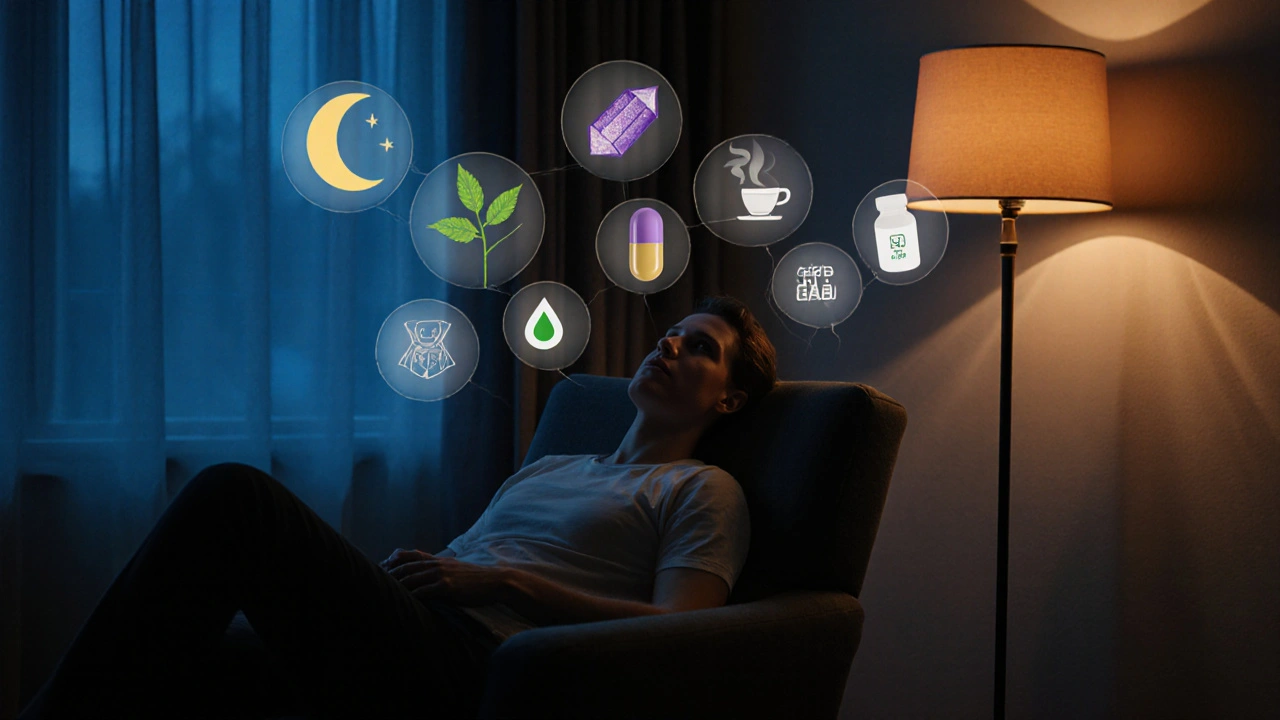Sleep Aid Selector
What is your main sleep issue?
How quickly do you need relief?
Do you have any medical conditions or take medications?
Enter your details and click "Get Recommendation"
Quick Take
- Melatonin is a hormone that helps signal your body it’s time to sleep.
- Valerian root, magnesium, 5‑HTP, L‑theanine, and CBD oil are popular natural substitutes.
- Prescription options like zolpidem act faster but carry higher risk.
- Consider onset time, half‑life, side‑effects, and any medical conditions before choosing.
- Good sleep hygiene boosts the effectiveness of any supplement.
Getting enough shut‑eye has become a daily battle for many. While melatonin tops the list of over‑the‑counter sleep aids, a raft of alternatives promise the same sweet slumber without the same drawbacks. This guide breaks down the science, compares the contenders head‑to‑head, and helps you decide which option fits your routine best.
What Is Melatonin?
Melatonin is a naturally occurring hormone produced by the pineal gland that regulates the body’s circadian rhythm. Levels rise after dark, signaling the brain that it’s time to wind down, and fall in the morning, preparing you for wakefulness. Synthetic melatonin supplements mimic this pattern, making it easier to fall asleep, especially during jet lag, shift work, or occasional insomnia.
Typical dosages range from 0.5mg to 5mg taken 30‑60 minutes before bedtime. Because it works by nudging the body’s internal clock rather than directly sedating the brain, melatonin usually produces mild side‑effects such as drowsiness the next morning or vivid dreams.
Popular Natural Alternatives
Below are the most common non‑prescription options that people turn to when melatonin isn’t enough or they prefer a different mechanism.
Valerian Root
Valerian root is an herbal extract traditionally used to calm the nervous system and promote relaxation. Its active compounds, valerenic acids, interact with GABA receptors to produce a soothing effect.
Dosage: 400‑900mg of standardized extract, taken 30 minutes before bed. Onset is slower than melatonin, often taking 2‑3 weeks of consistent use to notice a difference.
Magnesium
Magnesium is an essential mineral involved in over 300 enzymatic reactions, including those that regulate muscle relaxation and neural activity.
Supplementing with 200‑400mg of magnesium glycinate or citrate can calm restless legs and improve overall sleep quality, especially for those with a dietary deficiency.
5‑HTP (5‑Hydroxytryptophan)
5‑HTP is a natural amino acid precursor to serotonin, which later converts to melatonin in the brain. By boosting serotonin levels, it may indirectly raise melatonin production.
Typical dose: 100‑300mg taken 30‑60 minutes before sleep. Users report improved mood and quicker sleep onset, but it can interact with antidepressants.
L‑Theanine
L‑Theanine is an amino acid found in tea leaves that promotes alpha‑brain wave activity, leading to a relaxed yet alert state.
Dosage: 100‑200mg about 30 minutes before bed, often combined with caffeine‑free herbal tea for synergistic calm.
CBD Oil
CBD oil is a non‑psychoactive cannabinoid extracted from hemp that may reduce anxiety and pain, both common sleep disruptors.
Recommended intake: 10‑25mg sublingually 30‑60 minutes before bedtime. Effects vary widely due to product quality and individual metabolism.
Prescription Option: Zolpidem
Zolpidem is a prescription hypnotic (often known by the brand name Ambien) that enhances GABA activity, inducing rapid sleep onset. It’s intended for short‑term use due to tolerance and dependency risks.
Usual dose: 5‑10mg taken right before bed. Side‑effects can include sleepwalking, memory lapses, and next‑day drowsiness.

Side‑by‑Side Comparison
| Supplement | Typical Dose | Onset (minutes) | Half‑Life (hours) | Main Action | Common Side‑Effects |
|---|---|---|---|---|---|
| Melatonin | 0.5‑5mg | 30‑60 | 0.5‑1 | Chronobiotic - resets circadian clock | Drowsiness, vivid dreams |
| Valerian Root | 400‑900mg | 60‑120 | 2‑4 | GABA‑modulation - promotes relaxation | Headache, stomach upset |
| Magnesium | 200‑400mg | 60‑90 | 30‑40 | Muscle relaxation, nerve calm | Diarrhea (high doses) |
| 5‑HTP | 100‑300mg | 45‑60 | 2‑3 | Serotonin boost → melatonin synthesis | Nausea, interactions with SSRIs |
| L‑Theanine | 100‑200mg | 30‑45 | 1‑2 | Alpha‑wave increase - calm alertness | Rare, mild headache |
| CBD Oil | 10‑25mg | 45‑90 | 1‑2 | Anxiolytic - reduces anxiety & pain | Dry mouth, low blood pressure |
| Zolpidem | 5‑10mg | 15‑30 | 2‑3 | GABA agonist - deep sedation | Memory loss, sleepwalking, dependence |
Choosing the Right Sleep Aid
There’s no one‑size‑fits‑all answer. Your choice should hinge on three factors:
- Why you’re struggling to sleep. If you’re battling jet lag, melatonin’s clock‑resetting power is ideal. For chronic anxiety‑driven insomnia, CBD or L‑theanine may be more effective.
- How quickly you need relief. Prescription zolpidem works within minutes but should be a short‑term bridge. Natural options generally need regular use for 1‑2 weeks before noticeable benefits.
- Health profile and drug interactions. Those on antidepressants should avoid 5‑HTP. Kidney disease patients need to watch magnesium doses. Always discuss with a healthcare provider.
For most healthy adults, starting with a low dose of melatonin (0.5mg) is safe, cheap, and well‑studied. If you experience grogginess, try a later‑release formulation or pair it with magnesium to smooth out the transition.
Practical Tips & Safety
- Take supplements at the same time each night to reinforce your body’s rhythm.
- Avoid bright screens, caffeine, and heavy meals within two hours of bedtime.
- Store all products in a cool, dry place; potency can degrade after 24 months.
- If you’re pregnant, nursing, or have a chronic condition, consult a doctor before adding any supplement.
- Monitor how you feel the next day; any lingering drowsiness signals you may need a lower dose or a different agent.
Frequently Asked Questions
Can I combine melatonin with other sleep aids?
Yes, but with caution. Pairing melatonin with magnesium or L‑theanine is generally safe and can smooth the onset. Mixing it with prescription sedatives like zolpidem increases the risk of excessive drowsiness and should be avoided unless your doctor approves.
How long does melatonin stay in my system?
Melatonin’s half‑life is short-roughly 30‑60 minutes-so it’s mostly cleared within a few hours. That’s why it rarely causes next‑day grogginess when taken at appropriate doses.
Is CBD oil legal for sleep?
In the United States, CBD derived from hemp with less than 0.3% THC is federally legal. Still, state laws vary, and quality control is uneven. Choose products that provide third‑party lab results.
What’s the safest dose of valerian root?
Start with 400mg of a standardized extract 30 minutes before bed. If you tolerate it well, you can increase up to 900mg, but more doesn’t always mean better sleep.
Can magnesium help with restless legs?
Yes. Magnesium supports muscle relaxation and nerve function, which can reduce the uncomfortable sensations of restless leg syndrome. A nightly dose of 200‑400mg in a well‑absorbed form (glycinate or citrate) is often recommended.
Should I use melatonin every night?
Occasional use is fine, but regular nightly use can lead to diminished natural production in a few people. If you find yourself needing it nightly for months, talk to a clinician about underlying sleep disorders.

Next Steps
Start by tracking your sleep patterns for a week-note bedtime, wake time, caffeine intake, and any nighttime awakenings. Pick one supplement that aligns with your primary issue (e.g., melatonin for jet lag, magnesium for muscle tension). Use the lowest effective dose, stick to a consistent schedule, and re‑evaluate after two weeks. If you still struggle, consider consulting a sleep specialist to rule out apnea or chronic insomnia.

Honestly, the whole melatonin hype is just a marketing circus. People swallow cheap pills and expect miracles, but most of the research is half‑baked and the side‑effects get glossed over. If you’re looking for a real solution, stop relying on a bedtime hormone and start fixing your sleep hygiene first.
Whoa, Jill, calm the fireworks! Melatonin isn’t a unicorn, but it’s a legit tool for jet‑lagged sailors drifting across time zones. Sprinkle a low dose, keep the lights dim, and you’ll dodge the midnight monster without turning your brain into a foggy swamp.
While Ms. Chung’s metaphorical flourish is appreciated, one must acknowledge that the evidence base for melatonin remains equivocal. Numerous randomized trials reveal marginal benefits at best, often confounded by placebo effects and heterogeneous dosing regimens. Consequently, endorsing it as a panacea borders on intellectual negligence.
Hey folks, I get the back‑and‑forth, but let’s remember the golden rule: consistency beats the flashiest supplement. Whether you pick melatonin, magnesium, or a calming tea, take it at the same clock‑time each night and pair it with a screen‑free wind‑down. Your body will thank you with deeper, more restorative slumber.
Spot on, Juan! 👍 Consistency is king, and don’t forget to check the label for filler junk – some melatonin capsules are packed with sugar or artificial colors. A clean, minimal‑ingredient product + a solid bedtime routine = 😴 sweet dreams.
Sleep, that elusive veil that cloaks our consciousness, is not a commodity to be bartered with cheap over‑the‑counter potions. When you reach for melatonin without scrutinizing its pharmacodynamics, you gamble with the delicate equilibrium of your endocrine orchestra. The pineal gland, a quiet sentinel, secretes melatonin in response to darkness, and flooding the system with exogenous doses can blunt its natural rhythm. Moreover, the half‑life of synthetic melatonin is fleeting, often leaving users with residual drowsiness at the wrong hour. If you pair it with stimulants like caffeine later in the evening, you create a hormonal tug‑of‑war that compromises restorative phases such as REM. Alternative agents like magnesium or L‑theanine, though slower to act, nurture the neuromuscular and neurochemical pathways integral to tranquility. Magnesium, for instance, facilitates GABA synthesis, a neurotransmitter that quiets cortical arousal without the abrupt sedation of hypnotics. L‑theanine promotes alpha‑wave activity, fostering a relaxed yet alert mental state conducive to natural sleep onset. On the other hand, valerian root, steeped in centuries of herbal tradition, modulates GABA receptors subtly, reducing anxiety without the crash. Skipping the foundational pillars-consistent bedtime, dim lighting, and reduced screen exposure-renders any supplement a hollow Band‑Aid. The literature underscores that behavioral interventions often eclipse pharmacologic ones in long‑term efficacy. Therefore, before you pop another melatonin tablet, audit your sleep hygiene, dietary patterns, and stress levels. A holistic approach, integrating both lifestyle adjustments and judicious supplement selection, will outlast any fleeting chemical shortcut. In the end, mastery over sleep lies not in chasing the next miracle pill but in honoring the body’s intrinsic circadian choreography.
I hear you, Liliana, and I appreciate the deep dive into the neuro‑chemical ballet of slumber. While I agree that lifestyle foundations are paramount, I’d add that a modest melatonin dose can act as a useful catalyst during transitional periods, such as shift changes or cross‑time‑zone travel. Pairing it with magnesium at bedtime may smooth the hand‑off between exogenous and endogenous pathways, minimizing the grogginess you mentioned. Consistency, as Juan noted, remains the linchpin-taking the supplement at the same hour trains the body’s feedback loop. Ultimately, a personalized blend of habit and supplement, calibrated to individual response, often yields the most sustainable results.
Keep it steady, stay motivated, and watch your sleep transform.